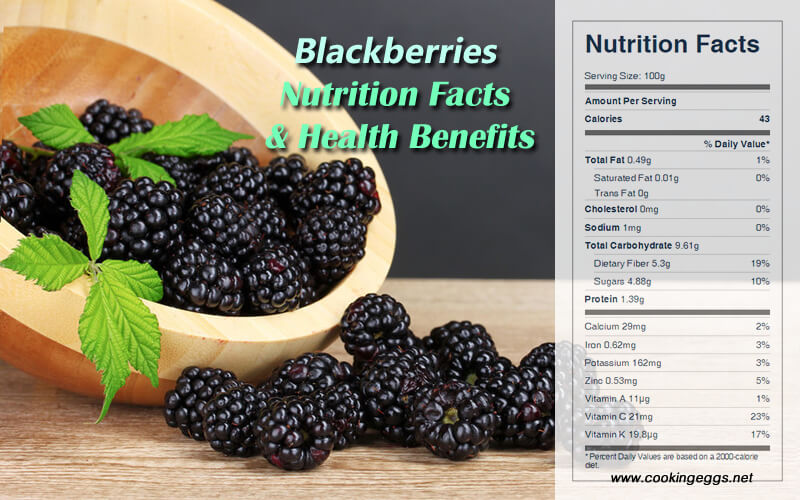Blackberries Nutrition Facts & Health Benefits
Blackberries belong to the rubus genus of the rosaceae family. Berries are nature’s candy. All berries share similar benefits, especially for our digestive system and immune health. Blackberries grow wild throughout most of Europe. They are an important element in the ecology of many countries, and harvesting the berries is a popular pastime.
Blackberries contain vitamin C, niacin, pectin, sugars, anthocyanins, and flavonoids, especially kaempferol and quercitin. Blackberries are a tasty treat all by themselves. Of course, they can also be enjoyed in raw pies, tarts, jams, and soups, and can even be used as food coloring.

The nutritional value of blackberries
Raw blackberries are 88% water, 10% carbohydrates, 1% protein, and 0.5% fat. In a 100 gram reference amount, raw cultivated blackberries supply 43 calories and a rich content of dietary fiber, manganese (31% DV), vitamin C (25% DV), and vitamin K (19% DV).
One-half cup of raw blackberries provides 37 calories, 9.2 g carbohydrate, 0.5 g protein, 0.3 g fat, 3.8 g dietary fiber, 119 IU vitamin A, 15 mg vitamin C, 24 mcg folic acid, 141 mg potassium, 23 mg calcium, 15 mg phosphorus, and 14 mg magnesium.
Raw Blackberries Nutrition Facts Label
Health Benefits of Blackberries
Berries such as blueberries, blackberries, and strawberries have high levels of anthocyanins and polyphenols, which means they have wonderful antioxidant capacities. Additionally, berries can protect against irritable bowel syndrome, reduce inflammation, and strengthen our immune system.
Blackberries may help you live longer. The pigments that give them their color are strong antioxidants, and they retain that power when eaten. They’re also rich in anthocyanins, and there is laboratory evidence that anthocyanins may be effective against cancer, diabetes, inflammation, bacterial infections, and neurological diseases. Every 100 grams of blackberries provides 317 mg of anthocyanins.
Blackberries are a good source of vitamin C, which is low compared with citrus or even with raspberries. Vitamin C is an essential nutrient involved in the repair of tissue, the formation of collagen, and the enzymatic production of certain neurotransmitters. It is required for the functioning of several enzymes and is important for immune system function. It also functions as an antioxidant.
Ethnomedicinal uses of blackberries are most often related to the health of the GI tract (colitis, diarrhoea, throat ailment, urinary infection), anemia, and illness of the kidney and liver. This may be linked to the phenolic compounds that are present at relatively high concentrations in blackberries.
Blackberries contain numerous phytochemicals, including polyphenols, flavonoids, anthocyanins, salicylic acid, ellagic acid, and fiber. Anthocyanins in blackberries are responsible for their rich dark color.
The main composition of phenolic compounds in blackberries comprises mainly ellagitannins, anthocyanins, flavonoids, and phenolic acids. Ellagitannins are the most representative compounds in blackberries; the ellagitannin content in mature fruit can reach between 84 and 130 mg. These values are inclusively higher than the average content found in pomegranates, a commercially recognized food source of ellagitannins. Therefore, blackberries are probably one of the main food sources of ellagitannins in western diets, along with strawberries, which have a much lower ellagitannin content but are more frequently consumed.
This is particularly the case for ellagitannins and, to a lesser extent, anthocyanins and flavonoids. Many studies on the potential health effects of berries have assessed the bioactivity of the original compounds as they are present in food. Berries demonstrate the ability to increase good bacterial species (Bifidobacterium and lactobacilli) in our microbiome, reduce overall inflammation, and positively affect and strengthen the adaptive immune system. There have been several studies that assess the protective effect of berries on inflammatory conditions of the gut, finding a positive inverse correlation with their ingestion.
Berries can reduce toxins produced by gastric bacteria. Blueberries and blackberries were found to decrease the presence of harmful bacteria such as clostridium, enterococcus, and E. coli—these harmful bacteria have a strong correlation to the development of inflammatory bowel disease. Polyphenol fermentation also provides benefits for our gut health: the polyphenols (anthocyanin, epicatechin, and quercetin) from berries are not absorbed in the small intestine.
Blackberries contain numerous large seeds that are not always preferred by consumers. The seeds contain oil rich in omega-3 (alpha-linolenic acid) and omega-6 (linoleic acid) fats as well as protein, dietary fiber, carotenoids, ellagitannins, and ellagic acid.
Rubus fruits are definitely part of the so-called functional foods that can positively impact human health. They could be effective at preventing chronic diseases. The dietary burden of anthocyanins and ellagitannins in a typical western diet is still extremely low. It is absolutely critical that blackberries, raspberries, and berries in general be part of a healthy diet.